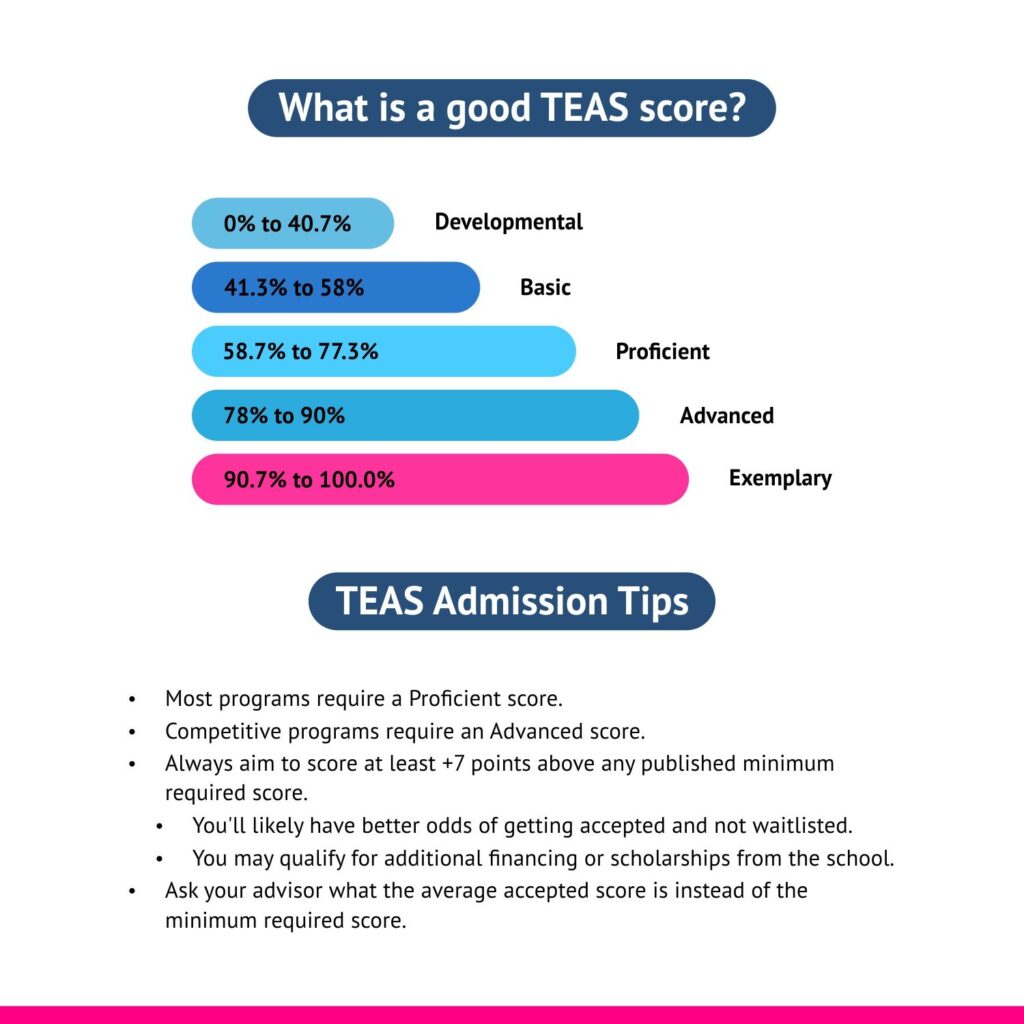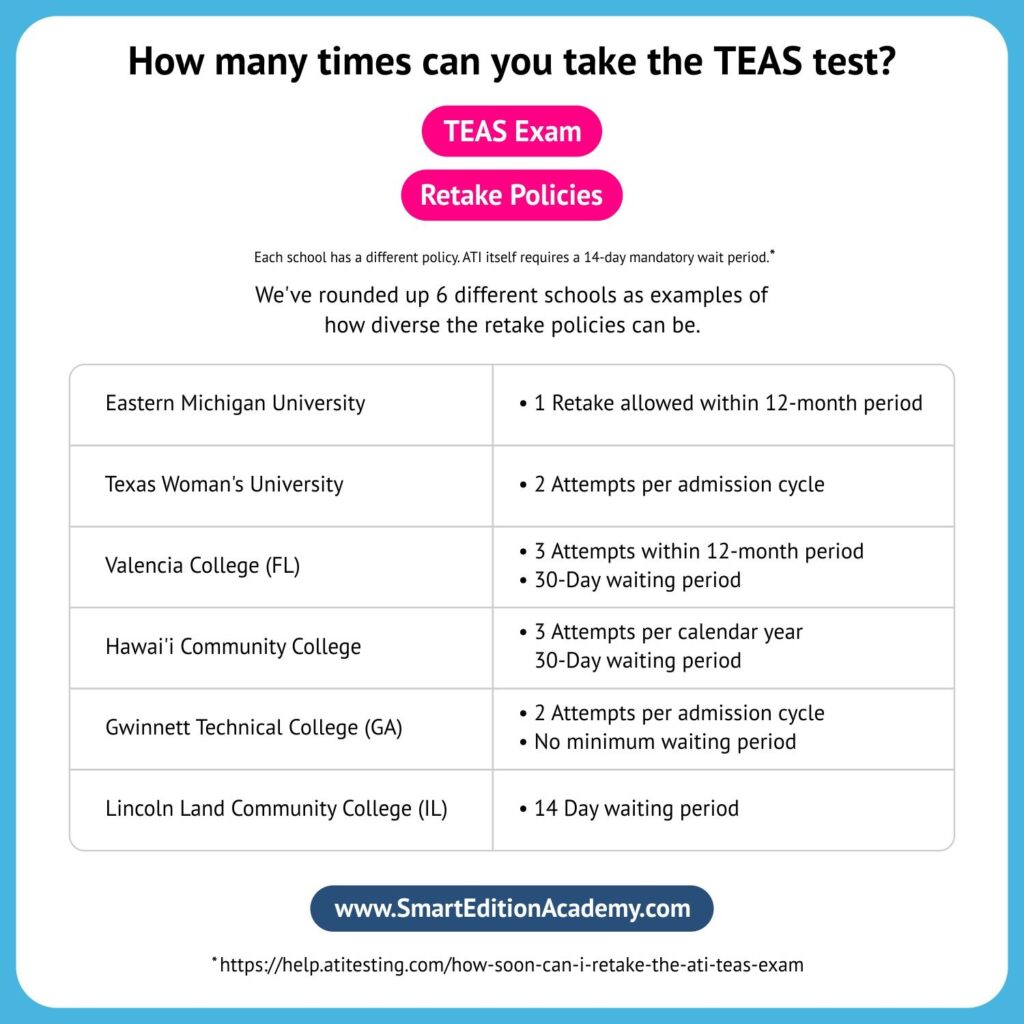Share Blog
Melissa Wynne
What Is A Passing TEAS Score
The TEAS test is not a pass or fail exam and every school’s passing score is different which can vary from anywhere between 50%-90%.
Many programs will have a minimum passing score that you will need to achieve in order to be considered, schools will typically select applicants with the highest scores among other application factors like prerequisite courses, GPA, and any relevant experience you may have.
The TEAS passing score can vary widely and it’s more typical to see lower score requirements for a 2 year associate’s degree program which is usually somewhere between the 50% to 65% range.
If you are applying to a bachelor’s degree program the score requirements can be much higher well into the 70-80%+ range.
Another big factor for the TEAS test passing score for any particular school is how competitive the school is.
Some states like California are very competitive and might have 300 applicants for only 50 seats, in those types of situations the required TEAS test score can be on the highest end which can be in the upper 80% range.
The official ATI TEAS test passing score breakdown is:
- Developmental 0% to 40.7%
- Basic 41.3% to 58%
- Proficient 58.7% to 77.3%
- Advanced 78% to 90%
- Exemplary 90.7% to 100.0%

How Is The TEAS Test Scored
After you complete the TEAS test you will receive a TEAS score report.
The score report consists of:
- Adjusted composite score,
- Adjusted sub-content area score
- National mean score
- Program mean score
- National percentile rank
- Program percentile rank
Let’s go over each of these scores:
TEAS Composite Score
The adjusted composite score is your overall score of all four sections of the TEAS test which are reading, math, science and English. It is calculated by taking the percent of questions that you answered correctly and then it is adjusted or weighted for the differences in the difficulty of the form or test questions themselves.
Your composite score is what will be used if you passed or failed according to the minimum required scores for your school.
TEAS Content Area Scores
Your score report will include percentage scores in each of the four content areas math, reading, science and English.
Like the total score, it is presented as a percentage ranging from 0 to 100%.
ATI adjust your content area scores to account for different test versions.
How exactly this works is information that is available outside or ATI so using the content area scores to calculate the total score is not possible. However it most likely does not vary dramatically and you can still use your practice test scores to gauge how you would do on the real test.
TEAS Sub-content Area Score
This section of your score report shows how well you performed in each subsection of the test which would be your individual scores for math, reading, science and English.
Some schools have specific requirements for a subsection, for example in addition to an overall composite score requirement they may also require a certain score for the science section.
Students can benefit from the TEAS sub-content area scores to identify areas for improvement should you have to take the test more than once which is not uncommon.
TEAS National Mean Score
Your TEAS national mean score shows how your score compares with other students across the country who have taken the TEAS exam. For example if your mean score is 80% it means you scored better than 80% of students who have taken the TEAS test.
TEAS Program Mean Score
The TEAS program score shows the average score for a schools nursing program which is based off of the scores from applicants. This score helps you understand how competitive your school is and how you compare to your school’s mean score.
TEAS National Percentile Rank
The TEAS national percentile rank shows the percentage of test takers who scored below your score.
TEAS Program Percentile Rank
If provided this is similar to the national percentile rank in that it shows you the percentage of students who scored lower than you who are in the same program that you are applying to.
How Many Times Can You Take The TEAS Test?
Most schools do allow you to retake the TEAS exam however every program has different restrictions on how many times you can take it and how long you need to wait between taking it again.
Some schools allow up to 3 retakes while others only allow for one test attempt and some schools will make you wait 30-45 days before you can retest.
The best thing you can do is to check with the program you are applying to and see what their requirements and restrictions are and plan accordingly.
How long Are My TEAS Exam Scores Good For
After taking the test in most cases you can use your TEAS scores for 24 months to submit with your application to your program or school.
Some schools do have different policies and might only accept scores for 12 months so if you plan to submit an older TEAS test score make sure you check with your school to see if they have a policy that is different than 24 months.
Can I Share My TEAS Scores With More Than One School
Once you receive your score you can share the score with any program you are applying to and that includes multiple schools if you want. There is a fee of $27 for each school you would like to send your results to.
How Long Does It Take To Get TEAS Results
Scores are provided immediately upon completion of the exam when taken on a computer. In some cases schools might take up to 2 business days to provide the scores so it’s best to check with your school or testing center to see how long it might take.
While you might receive your scores on the computer immediately after completing the TEAS test exam, it still might take up to 72 business hours before they appear in your ATI account online.
Conclusion
If you have a better understanding of what is a passing TEAS score then congratulations!
If you’re still confused don’t worry it’s not the easiest thing to wrap your head around but don’t worry it will all start to make more sense once you become more familiar with the test.
You can get a head start by learning how to study for the teas test.
You can also start becoming more familiar with each topic, this TEAS math section review is a great place to start and you can move on to each of the other topics from there.

Melissa Wynne
Pediatric Nurse Practitioner Founder Smart Edition Nursing
Melissa founded Smart Edition Nursing in 2018. She has a bachelors and masters degree in nursing from Northeastern University in Boston. Melissa is a Pediatric Nurse Practitioner at Gulf Stream School in Gulf Stream Florida.
